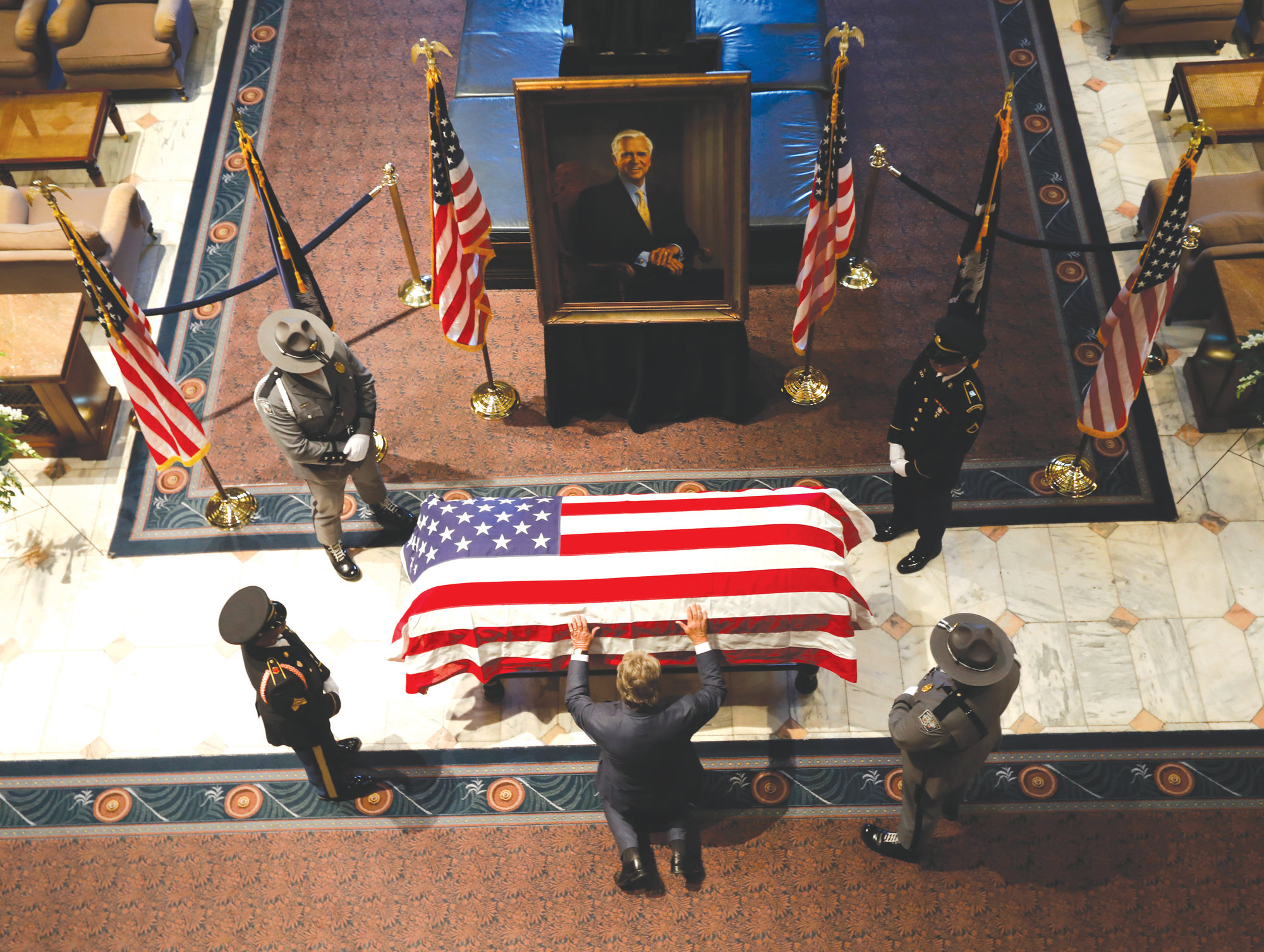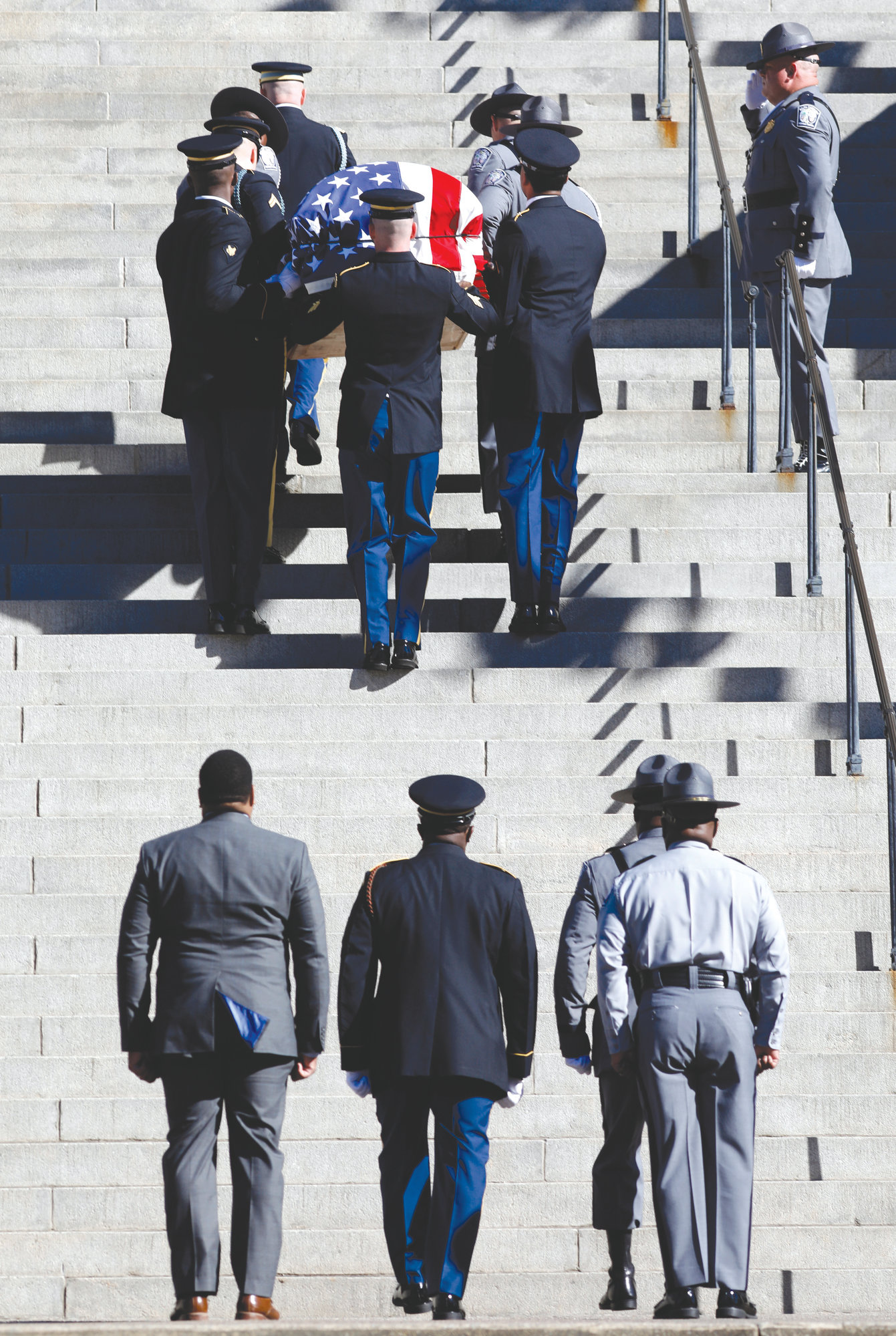Gov. McMaster: 'Fritz' Hollings was 'among the best of us'
The Associated Press
COLUMBIA - Friends, colleagues and longtime admirers remembered Ernest F. "Fritz" Hollings on Monday as a hard-working campaigner and representative who served South Carolina, in one way or another, for 50 years.
More than 100 mourners filed past the casket of the former South Carolina governor and longtime U.S. senator as it lay in repose in the South Carolina Capitol, in a second-floor lobby between the House and Senate chambers. Surrounded by an honor guard and draped in an American flag, the casket lay before a smiling portrait of Hollings, bestowing his wide, trademark smile.
Hollings died April 6 at his home on Isle of Palms at age 97.
Hollings helped shepherd South Carolina through desegregation as governor before embarking on his long and colorful career in the Senate, from which he retired in 2005 after six terms. At that point, the Democrat had served 38 years and two months, making him the eighth longest-serving senator in U.S. history.
Following Hollings' family, Gov. Henry McMaster and his wife, Peggy, were the first to file past Hollings' casket, pausing to view a board showing photos dating back to Hollings' days at The Citadel and Army service during World War II. Afterward, the Republican governor recalled Hollings as a figure for whom representation of the state transcended political party at times.
"I think we ought to remember that politics is a part of life, but it's not all of life," McMaster told reporters. "Fritz worked hard. He campaigned hard, but he did a great job, and I'm proud to have known him. ... He was among the best of us."
McMaster is expected to speak at Hollings' funeral at The Citadel today. House Majority Whip Jim Clyburn of South Carolina, a Sumter native, and former Vice President Joe Biden, Hollings' longtime desk mate in the U.S. Senate, are also scheduled to deliver eulogies. On Sunday, relatives, friends and former colleagues paid their respects at a Charleston funeral home.
Running for governor in 1958, Hollings initially campaigned against desegregation, later building a national reputation as a moderate on that issue and others, pleading with the Legislature to peacefully accept integration of public schools and the admission of the first black student to Clemson University.
On Monday, Bishop Frederick Calhoun James, an African Methodist Episcopal pastor who knew Hollings for more than 50 years, was among the first to file past his casket. Pausing a moment, the 97-year-old James gingerly stood up from his wheelchair and placed a hand on the flag draped over Hollings' casket, his mouth moving in an inaudible final tribute to a man he later said he considered a dear friend of strong faith who carefully navigated the politics of the civil rights era in the South.
"He felt that we were doing the state a disservice by not providing the best education for most of the people in South Carolina," James told reporters, of Hollings' work on desegregation. "And he said, 'I don't want to put myself out of business, out of political business in my home state ... but I also know that we got some brilliant black people in South Carolina who are not having the opportunity to make that contribution,' and he said, 'I believe there is some way, and I'm going to see if I can find it.'"
After the death of Strom Thurmond in 2003, Hollings was one of the last of the larger-than-life Democrats who dominated politics in the South. On Monday, former state Democratic Party Chairwoman Carol Fowler said his passing represented part of the end of an era.
"I was just thinking this morning about political giants that everybody knows, everybody respects - we don't have any anymore," Fowler said. "This is the last one. I don't know who these other people are, and nobody else does either."
More Articles to Read




